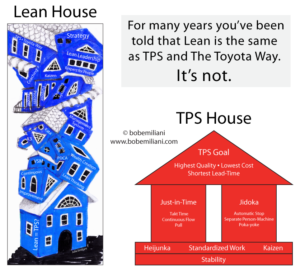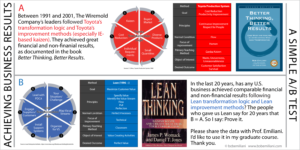
This year is the 20th anniversary of the founding of the Lean Enterprise Institute (LEI). There will surely be a big celebration. But in my view, there is less to celebrate than meets the eye. Here’s why:
LEI has controlled the progressive management agenda for the last 20 years. That means they own the failures as well as the successes. By LEIs own reckoning (as well as the its sister organization, the Lean Enterprise Academy in the U.K.), success has been much less than they had hoped for. Despite this, the focus remains on success, as this recent call for presenters illustrates:
“We are currently looking for presenters to share their own lean journeys at the UK Lean Summit 2017. If you feel your story is compelling and would like to share it with other Lean practitioners please get in touch by emailing us at…”
Without question, LEI’s influence has been great. So great, that many organizations cannot be convinced that value stream maps are not necessary in order to see waste and improve processes; that A3 reports are for use by managers, not front-line workers; that “trystorming” at the genba is more important than brainstorming in conference rooms; or, that Toyota-style industrial engineering-based kaizen is fundamental to creating flow. People have become dependent on LEI to feed them knowledge and define their course of action, rather than thinking for one’s self.

In my view, James P. Womack and Daniel T. Jones’ interpretation of TPS has been, plainly stated, wacky. Built piece-by-piece over the years, after they finally recognize the need for each additional piece, like an old manufacturing building with multiple add-ons to the primary structure. The result is a disjointed representation of Toyota production system and The Toyota Way that hardly makes any sense. In following LEIs prescriptions, both individuals and organizations have put a lot of effort into improvement over the years and have achieved mostly meager business results.
In the middle image, above, I posed a simple A/B test in social media, that, thus far, has gone unchallenged. The empirical evidence indicates that the results achieved in most organizations over the last 20 years (B) do not impress senior leaders, which forces them to look for other (typically zero-sum) ways to improve financial and non-financial performance. That is a terrible outcome. Organizations that have focused on TPS (A) have achieved much better results, and their leaders rarely use zero-sum methods to improve performance. That means better outcomes for all stakeholders – employees, suppliers, customers, investors, and communities.

Despite this, there exists an illusion (image at right) that people know more about Lean than they actually do. This, apparently, is based on what they have been told or read, not based on what they have done with by getting their hands dirty. As Michael Ballé recently noted on LinkedIn, at a Lean conference attended by 250 people, only 3 or 4 had read Womack and Jones’ books. Have they read Ohno’s books on TPS? Probably not. Or Liker’s books on Toyota? Probably not. Have they read about Taylor’s Scientific Management? Most assuredly not. Lean is hardly the first subject that people have taken an interest in without bothering to study it.
Unfortunately, knowledge illusions affect all humans [1], but they are particularly limiting when it comes to progressive management and especially TPS [2]. The reality that one must operate under is as Ohno once said: “…assume that things are a mess” all the time, even when things appear to be perfect. As Fujio Cho said: “Our way of thinking is very difficult to copy or even to understand.”
And, finally, there is the harm that has come to people, through layoffs, bureaucratized Lean, flat wages despite productivity improvement, and so on, for which there is little acknowledgment and no apparent empathy, sadness, or regret. History has shown that harm done to people is common to progressive management in general, not to Lean in particular, among managers schooled in so-called “Western” business practices. For Lean, the helpful guiding hand of history was ignored.
So, for these reasons, I think it is time for change and improvement. That challenge rests in your hands.
Do the work that is required to find your leader – not a thought leader – but an actual leader. Someone who knows TPS and who will help you define a coherent course of action that yield business results and, simultaneously, does good things for people. And do the hard work necessary, toiling hands-on with your team through both failure and success, to gain the knowledge that enables you to “defend your castle yourself.”
